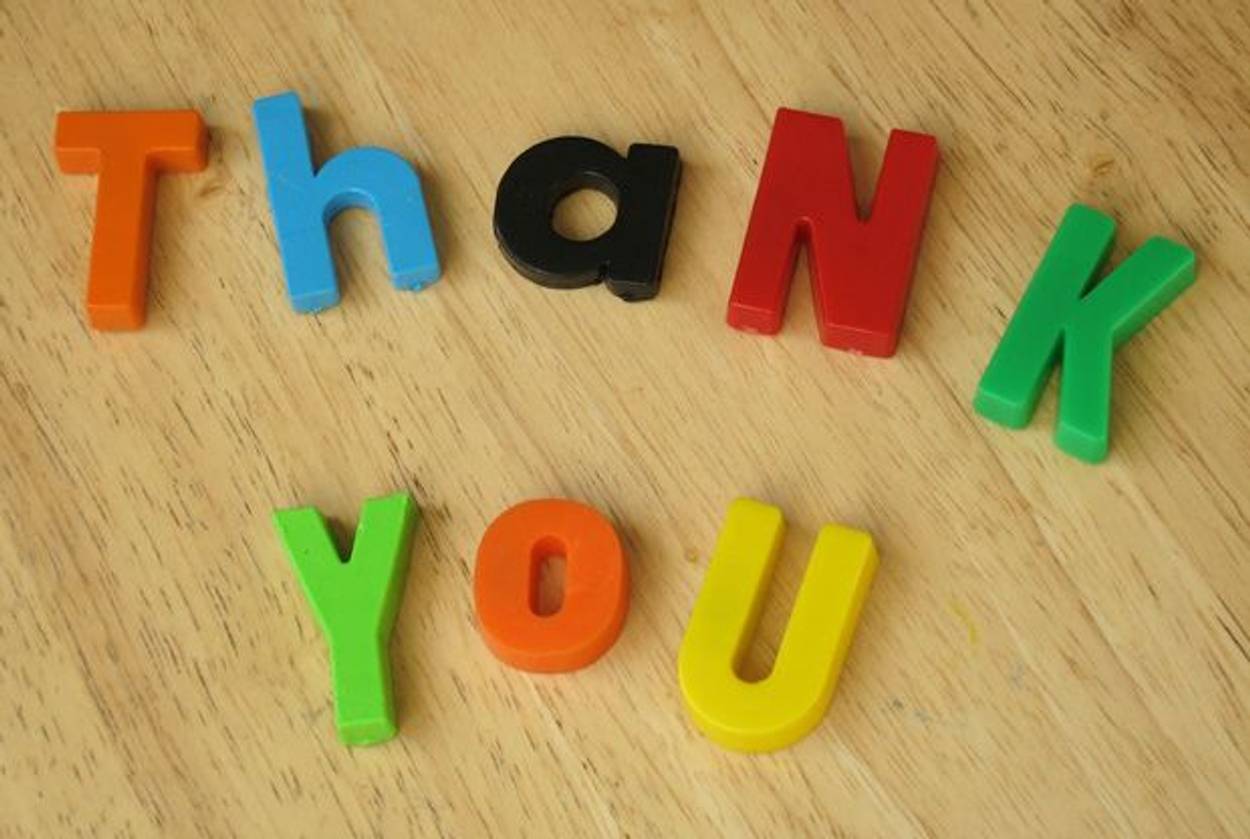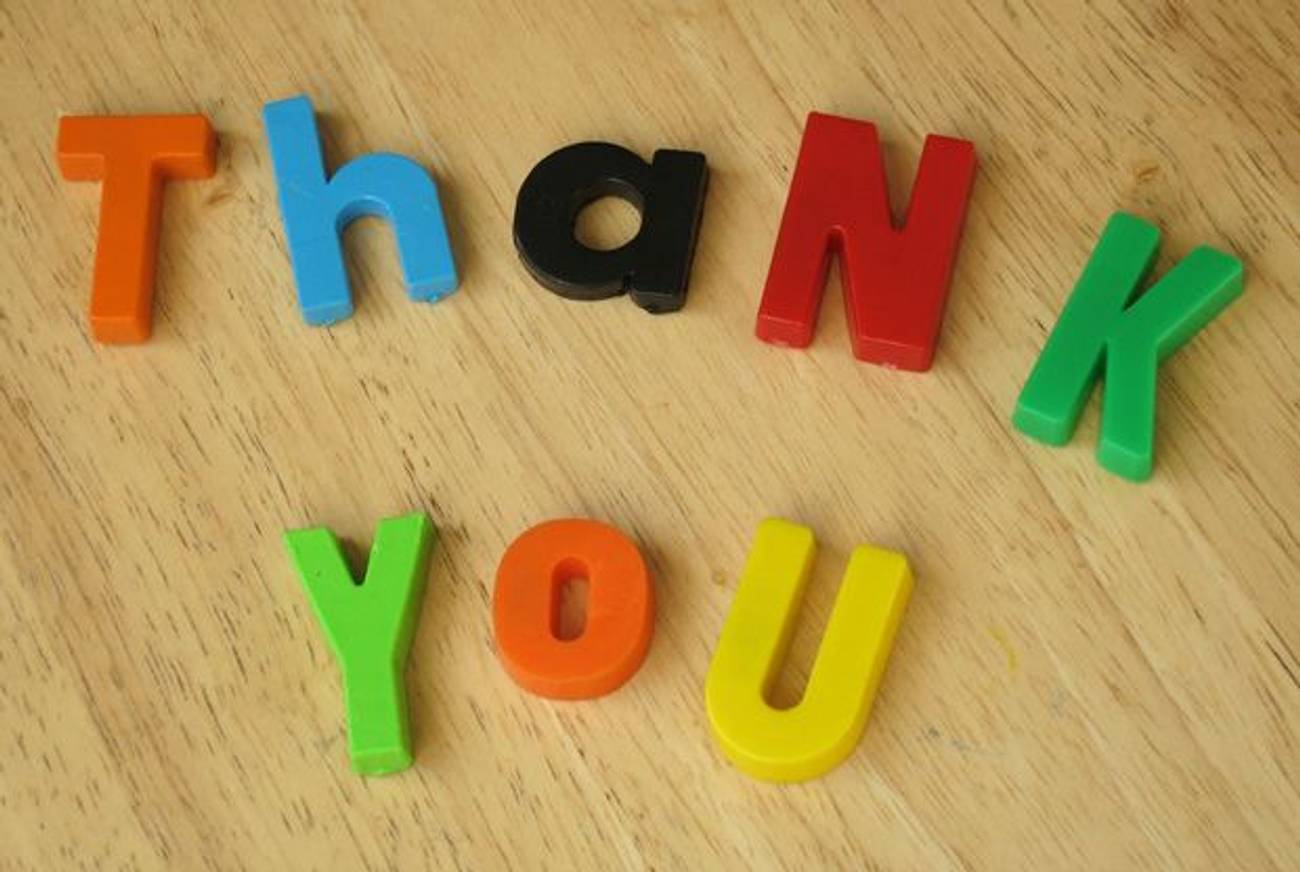How to Be Grateful
Children parrot their parents in every way—so if you want your kids to feel and express gratitude more frequently, you have to do that yourself




I worry about raising entitled, bratty, ungrateful little weasels. Children are born self-absorbed, for good reason: Selfishness increases one’s odds of living past toddlerhood. It’s why babies see the world as one big extension of self: If they worried about mama’s emotional state instead of their own desire for a tipple or a diaper change, they wouldn’t get their needs met. Evolution is delightfully efficient. But as children age, they start figuring out that they and their parents are different entities. That’s where separation anxiety comes in. Empathy develops as toddlers and preschoolers start to understand that people can be mean, that behavior has consequences, that their own actions have an impact on other people. Kids develop gratitude.
Gratitude isn’t just a civilizing influence that prevents us all from being overgrown babies; it also makes us happier. Psychologist Robert Emmons, at the University of California, Davis, who studies gratitude, has shown that it improves health, resilience, and emotional well-being. But it doesn’t grow in a vacuum. It’s our job as parents to make sure our kids develop social awareness and menschlikheit. But like many parents, I think I could be doing a lot better. So, on the eve of Thanksgiving, I’m pondering ways to step up my thankfulness training. Learn from my screw-ups:
I’m not religious about modeling the behavior I want to see.
I’m pretty good at saying “thank you” to the guy at the pharmacy. I’m not so good at expressing appreciation closer to home. A few years ago, I read an article about how spouses should say thank you regularly for the everyday tasks of family life. If your partner makes a delicious dinner, works late to bring home the fakon, or takes the kids to the asthma specialist, you’re supposed to say, “Thank you for supporting our family.” The cheesiness of this phrase made Jonathan, my husband, and me giggle, but for a few months we did it, and you know what? Hearing it feels really good, especially when paired with Meaningful Eye Contact. Kids should see their parents expressing appreciation. My own kids are good at the automatic “please” and “thank you,” but because I don’t often enough consider the big-picture “do I appreciate all I’ve got?” they don’t either.
Jeffrey Froh, a professor of psychology at Hofstra University, did a study in which he asked a group of middle-schoolers to keep “gratitude journals” for two weeks. The kids wrote down a few things they were grateful for every day. A second group of kids wrote down the day’s petty annoyances, and a third group did neither. The students who were made to think about what they had to be grateful for experienced a surge in optimism and a decrease in negative feelings.
Maybe I could suggest we talk about What I Have to Be Grateful for Today at the dinner table instead of playing Two Truths and a Lie (which I must ungratefully admit I’m utterly bored with) every time the conversation lulls.
I’m not being consistent with chores and allowances.
The kids are supposed to get their allowance and tzedakah money on Friday afternoons before Shabbat. I usually forget. This means that every time the kids want something—a giant gumball, a Webkinz—they start wheedling and calculating how many weeks allowance I owe them. Their pleading little voices make me want to stab myself with a fork. Josie is supposed to feed the cats in the morning, and Maxie is supposed to feed the fish in the afternoon, but they often forget, and I’m perpetually noodging them until my own voice makes me want to stab myself again with that fork. We need a simple, regularly implemented system: This is what you do as a member of this family. If I have to remind you, or if you don’t do it, your allowance gets docked. If you want something, you use your own money from your piggy bank, save up, or wait to see if you still want it when your birthday rolls around. I want to increase their list of tasks, too—we should have family dinner more often for all the usual reasons but also because I want the girls regularly setting and clearing the table. It’s not rocket science: Having to work for stuff makes you more grateful for the stuff you have.
I place too much emphasis on getting, not enough on giving.
It would be simply divine if Jews and Christians alike didn’t make December a month of gifting. Christmas is about Jesus’ birth; turning it into a celebration of nebulous merriment and wrapping paper is irksome. Hannukah is a minor holiday about the rededication of the holy temple and the tension between traditional and acculturated Jews. In my own tradition of hoping technology will solve all my parenting problems, I have allowed the girls to maintain their own Amazon wishlists, which they endlessly groom like My Little Ponies. They understand that putting things on a wishlist doesn’t mean they’re going to get anything on that list; it’s fantasy shopping, like fantasy baseball. I am draconian about the need for thank-you notes, but I need to work harder on getting the kids involved in gift purchasing for others. They also could be more involved in choosing how and where we donate money in honor of other people.
I fail to seek out gratitude and tolerance stories.
The book Molly’s Pilgrim is about a little girl who has recently emigrated from an Eastern European shtetl to the American Midwest, where her classmates mock her clothing and accent. As a Thanksgiving homework project, Molly’s teacher assigns her the task of making a pilgrim doll. When Molly explains to her baffled mother that a pilgrim is someone who leaves his or her old country in search of freedom and tolerance, her mother surprises her with a gorgeously made doll that looks like mama herself, not like a black-dress-and-buckle-shoe-wearing Puritan. At first the kids sneer, but Molly’s teacher sets them straight. Leaving aside a moral lesson today’s hyper-meddly parents should not be learning—when your child fails to do her homework, do it for her!—Molly’s Pilgrim is a great way to talk about how the values of Judaism and Thanksgiving intersect, and how lucky we are to live in a time when the people who are nastiest to American Jews are usually other Jews. I should make reading Molly’s Pilgrim—honestly, one of the best Jewish children’s books of all time—an annual tradition, like making hand turkeys and nutter-butter gobbler cupcakes. Thanksgiving is the perfect time to discuss the Jewish value of hakarat ha’tov, recognizing the good in our lives, and drawing parallels between books and news stories and our own privileged lives is something we should do far more often.
There’s never enough shehechiyanu.
Yes, we say the prayer for new and wonderful experiences on big occasions. But we could say it all the time. There are so many things to be thrilled by and grateful for. Last weekend my beautiful cousin Misha got married, and my Uncle Michael’s toast was a simple distillation of the prayer: “Dear Lord: Thank you for the gift of being here now.” It was the perfect blend of ancient Jewish values and hippie zen. But Uncle Michael’s words made me realize: Why wait for weddings? Why wait for the first night of Hannukah? Because remember, to quote the great Jewish sage Buckaroo Banzai, no matter where you go, there you are. Opportunities for gratitude are all around us. I want my kids to see them.
Marjorie Ingall is a former columnist for Tablet, the author of Mamaleh Knows Best, and a frequent contributor to the New York Times Book Review.